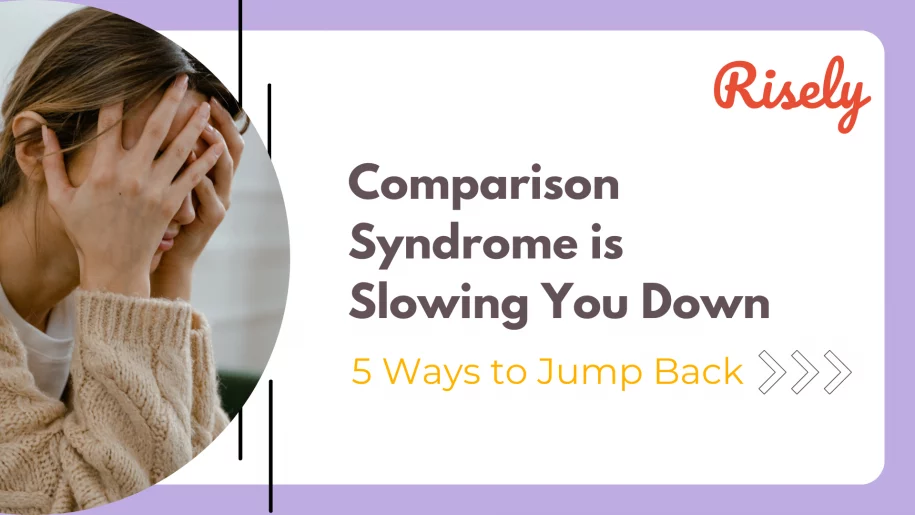Comparison Syndrome is Slowing You Down: 5 Ways to Jump Back
In today’s fast-paced and competitive world, it’s easy to fall into the trap of constantly comparing ourselves to others. Whether in our personal lives or the workplace, comparison syndrome can be a major roadblock to our success and happiness. But fear not, because this blog will delve deep into understanding what comparison syndrome is and how it affects us. We’ll explore the causes of this syndrome and its link with impostor syndrome. We’ll also discuss the role of social media in exacerbating these feelings of comparison. But most importantly, we’ll provide you with effective strategies and proven ways to overcome comparison syndrome and jump back into your lane of success. So if you’re ready to let go of comparison and start thriving on your terms, keep reading!Understanding Comparison Syndrome
Comparison syndrome, also known as social comparison, is a phenomenon that affects our lives in various ways. It can negatively impact mental health and well-being, as individuals may become obsessed with comparing themselves to others and seeking external validation. Recognizing when we fall into the comparison trap is essential to break free from its grasp. By focusing on our journey and embracing self-acceptance, we can overcome comparison syndrome and celebrate our achievements. It’s important to remember that each person’s path is unique, and comparing ourselves to others only leads to feelings of inadequacy and self-doubt. Let go of unrealistic expectations and the need for validation from others. Instead, cultivate gratitude and self-awareness to find clarity and avoid the thief of joy that comparison can be. By practicing mindfulness and compassion towards ourselves, we can break free from the comparison cycle and live a more fulfilling life.Identifying the Causes of Comparison Syndrome
Comparison syndrome, also known as social comparison or the tendency to compare oneself to others, can stem from various factors. Societal pressures fuel this syndrome, as we are often bombarded with images and messages that set unrealistic expectations for success and happiness. Social media can exacerbate these feelings of inadequacy, as platforms like Instagram and Facebook showcase curated versions of other people’s lives. Personal insecurities also contribute to comparison syndrome, as individuals may struggle with low self-esteem or feelings of unworthiness. Recognizing and challenging negative thoughts and beliefs about oneself is crucial in overcoming comparison syndrome. By practicing self-compassion, setting realistic goals, and focusing on personal growth, we can break free from the cycle of comparison and develop a healthier mindset.The Role of Social Media in Augmenting Comparison Syndrome
Social media platforms, such as Instagram and Facebook, often present an unrealistic and curated version of people’s lives, leading to comparison and feelings of inadequacy. The constant exposure to others’ successes and achievements on social media can have a negative impact on mental health, fueling feelings of envy and self-doubt. This amplified fear of missing out (FOMO) makes individuals believe they are not doing enough or living up to societal expectations. Limiting social media usage, unfollowing negative influencers, and practicing self-compassion are essential to combat comparison syndrome. Remember, social media is just a highlight reel and does not accurately represent real life. Focus on personal growth and set realistic goals to overcome comparison syndrome.Gender Differences in Experiencing Comparison Syndrome
Research suggests that women are more prone to experiencing comparison syndrome than men. They often compare their appearance, career success, and personal achievements to others. The rise of social media has played a significant role in exacerbating this phenomenon among women. It can lead to feelings of inadequacy, low self-esteem, and even mental health issues. To overcome these challenges, practicing self-compassion, setting realistic goals, and limiting exposure to social media can be helpful strategies. By cultivating self-awareness and focusing on personal growth, women can break free from the negative effects of comparison syndrome and embrace a healthier mindset.How does Comparison Syndrome link with Impostor Syndrome?
Comparison Syndrome and Impostor Syndrome are closely connected, revolving around feelings of inadequacy and self-doubt. While Comparison Syndrome involves constant comparison and feeling inferior, Impostor Syndrome is the belief that success is undeserved. It can contribute to Impostor Syndrome by highlighting perceived shortcomings in comparison to others. Comparison Syndrome and Impostor Syndrome are both psychological phenomena that can affect individuals’ self-perception and confidence. Comparison Syndrome refers to the tendency to compare oneself to others, often resulting in feelings of inadequacy or dissatisfaction. On the other hand, Impostor Syndrome is the belief that one’s achievements or success are undeserved or the result of luck rather than their own skills or abilities. The link between these two syndromes lies in how they can reinforce each other. When individuals with Impostor Syndrome compare themselves to others they perceive as more successful or accomplished, it can further fuel their feelings of inadequacy and reinforce their belief that they are not as competent as others. This comparison can perpetuate a cycle of self-doubt and undermine their self-esteem. Read more: A Manager’s Guide To Overcoming Imposter Syndrome At A New JobRecognizing Signs of Comparison Syndrome in Your Team
Comparison syndrome in the workplace can lead to negative consequences for both individuals and the entire team. When team members constantly compare themselves to others, it can result in feelings of inadequacy, low self-esteem, and even mental health issues. This toxic work environment puts pressure on employees to continuously outperform their colleagues, which can create tension and diminish collaboration. Recognizing the signs of comparison syndrome is crucial in addressing the issue. Some of these are:- Constant Comparison
- Negative Self-Perception
- Jealousy and Envy
- Low Self-Esteem
- Unhealthy Competition
- Excessive Social Media Use
- Difficulty in Celebrating Others’ Success
- Overemphasis on External Validation

